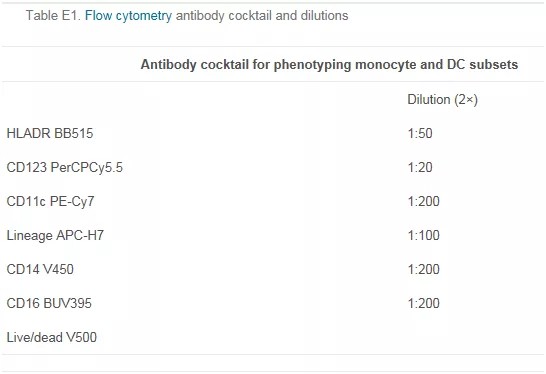JACI:早期先天免疫功能障礙可能是兒童食物過敏
發(fā)布日期:2018-11-13
原標(biāo)題:持續(xù)食物過敏的早期先天免疫特征

延伸閱讀
JACI
DOI: 10.1016/j.jaci.2017.10.024
Abstract:
Background
Food allergy naturally resolves in a proportion of food-allergic children without intervention; however the underlying mechanisms governing the persistence or resolution of food allergy in childhood are not understood.
Objectives
This study aimed to define the innate immune profiles associated with egg allergy at age 1 year, determine the phenotypic changes that occur with the development of natural tolerance in childhood, and explore the relationship between early life innate immune function and serum vitamin D.
Methods
This study used longitudinally collected PBMC samples from a population-based cohort of challenge-confirmed egg-allergic infants with either persistent or transient egg allergy outcomes in childhood to phenotype and quantify the functional innate immune response associated with clinical phenotypes of egg allergy.
Results
We show that infants with persistent egg allergy exhibit a unique innate immune signature, characterized by increased numbers of circulating monocytes and dendritic cells that produce more inflammatory cytokines both at baseline and following endotoxin exposure when compared with infants with transient egg allergy. Follow-up analysis revealed that this unique innate immune signature continues into childhood in those with persistent egg allergy and that increased serum vitamin D levels correlate with changes in innate immune profiles observed in children who developed natural tolerance to egg.
Conclusions
Early life innate immune dysfunction may represent a key immunological driver and predictor of persistent food allergy in childhood. Serum vitamin D may play an immune-modulatory role in the development of natural tolerance.
First Author:
Melanie R.NeelandPhD
Correspondence:
FRACP, FAAAI, PhD
All Authors:
Melanie R.NeelandPhDaJennifer J.KoplinPhDaThanh D.DangPhDabShyamali C.DharmageMBBS, MSc, MD, PhDacMimi L.TangMBBS, PhD, FRACP, FRCPA, FAAAAIabdSusan L.PrescottMD, PhD, FRACPeRichardSafferyPhDabDavid J.MartinoPhDab?Katrina J.AllenMBBS, BMedSc, FRACP, FAAAI, PhDabd?


——來自浙大迪迅
背景:食物過敏的兒童在不干預(yù)的情況下自然地解決了一定比例的食物過敏問題;然而,控制兒童食物過敏持續(xù)或消除的潛在機(jī)制尚不清楚。目的:本研究旨在明確1歲時(shí)蛋類過敏相關(guān)的先天免疫概況,確定兒童期自然耐受發(fā)育過程中出現(xiàn)的表型變化,探討早期先天免疫功能與血清維生素D的關(guān)系。方法:本研究采用縱向的方法,從一組以人群為基礎(chǔ)的挑戰(zhàn)隊(duì)列中收集到的PBMC樣本,這些樣本被證實(shí)是雞蛋過敏的嬰兒,他們?cè)趦和瘯r(shí)期有持續(xù)性或短暫的雞蛋過敏的結(jié)果,并量化了與雞蛋過敏的臨床表型相關(guān)的功能性先天免疫反應(yīng)。結(jié)果:我們發(fā)現(xiàn)持續(xù)的雞蛋過敏的嬰兒表現(xiàn)出獨(dú)特的先天免疫特征,與短暫的雞蛋過敏的嬰兒相比,其特征是循環(huán)的單核細(xì)胞和樹突狀細(xì)胞數(shù)量增加,在基線和內(nèi)毒素暴露后產(chǎn)生更多的炎癥細(xì)胞因子。后續(xù)分析顯示,這種獨(dú)特的先天免疫特征在持續(xù)對(duì)雞蛋過敏的兒童中持續(xù)存在,并 在自然耐受形成過程中發(fā)揮免疫調(diào)節(jié)作用
延伸閱讀
JACI
[IF:13.1]
Early life innate immune signatures of persistent food allergyDOI: 10.1016/j.jaci.2017.10.024
Abstract:
Background
Food allergy naturally resolves in a proportion of food-allergic children without intervention; however the underlying mechanisms governing the persistence or resolution of food allergy in childhood are not understood.
Objectives
This study aimed to define the innate immune profiles associated with egg allergy at age 1 year, determine the phenotypic changes that occur with the development of natural tolerance in childhood, and explore the relationship between early life innate immune function and serum vitamin D.
Methods
This study used longitudinally collected PBMC samples from a population-based cohort of challenge-confirmed egg-allergic infants with either persistent or transient egg allergy outcomes in childhood to phenotype and quantify the functional innate immune response associated with clinical phenotypes of egg allergy.
Results
We show that infants with persistent egg allergy exhibit a unique innate immune signature, characterized by increased numbers of circulating monocytes and dendritic cells that produce more inflammatory cytokines both at baseline and following endotoxin exposure when compared with infants with transient egg allergy. Follow-up analysis revealed that this unique innate immune signature continues into childhood in those with persistent egg allergy and that increased serum vitamin D levels correlate with changes in innate immune profiles observed in children who developed natural tolerance to egg.
Conclusions
Early life innate immune dysfunction may represent a key immunological driver and predictor of persistent food allergy in childhood. Serum vitamin D may play an immune-modulatory role in the development of natural tolerance.
First Author:
Melanie R.NeelandPhD
Correspondence:
FRACP, FAAAI, PhD
All Authors:
Melanie R.NeelandPhDaJennifer J.KoplinPhDaThanh D.DangPhDabShyamali C.DharmageMBBS, MSc, MD, PhDacMimi L.TangMBBS, PhD, FRACP, FRCPA, FAAAAIabdSusan L.PrescottMD, PhD, FRACPeRichardSafferyPhDabDavid J.MartinoPhDab?Katrina J.AllenMBBS, BMedSc, FRACP, FAAAI, PhDabd?
2018-10-24 Article
創(chuàng)建過敏性疾病的科研、科普知識(shí)交流平臺(tái),為過敏患者提供專業(yè)診斷、治療、預(yù)防的共享平臺(tái)。

 杭州浙大迪迅生物基因工程有限公司
杭州浙大迪迅生物基因工程有限公司

